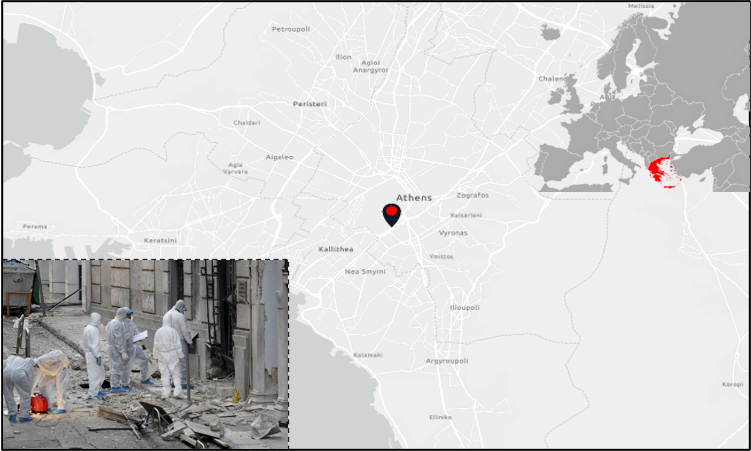| Reported: 11th April 2025 | Location: Athens, Greece |
Incident Details
On 11 April 2025, a bomb exploded outside the Hellenic Train offices in central Athens, Greece. The attack, claimed by the extremist group Revolutionary Class Struggle, cause significant structural damage, though fortunately no injuries were reported. The attack was linked to ongoing public anger over the 2023 Tempi train crash that killed 57 people.

Figure 1: Map showing the location of the blast. Image courtesy of the Wall Street Journal
Comment.
The Athens bombing, claimed by the extremist group Revolutionary Class Struggle, targeted the Hellenic Train offices in a busy central district, causing extensive structural damage and disrupted a key commercial hub. The attack stemmed from lingering outrage over the 2023 Tempi train crash, Greece’s deadliest rail disaster, which killed 57 people, mostly students, and injured 85 due to human error and outdated railway systems. That tragedy sparked massive unrest – over 100,000 people protested in Athens in March 2023, with 80 detained during 2025 anniversary clashes, according to Greek police reports. A 2025 poll showed 70% of Greeks believe the government shielded those responsible, fuelling extremist actions like this bombing.
Revolutionary Class Struggle also claimed a February 2025 bombing near the Labour Ministry, leading to substantial property damage once more, signalling a clear pattern of targeting state-affiliated sites. Greece has a history of such extremism: Revolutionary Struggle executed 17 bombings from 2003 to 2010, including a 2007 US Embassy attack costing $1.04 million in damages, according to Greek authorities. Conspiracy of Fire Nuclei conducted over 100 attacks between 2008 and 2014, with 70% involving explosives, targeting banks and government offices, as reported by Greek police.
Globally, extremist acts tied to public grievances pose similar risks to business travellers. In 2019, Italian authorities reported 12 anarchist bombings over infrastructure disputes, causing $2.21 million in damages. In 2022, Chile reported 15 bombings linked to indigenous land conflicts, disrupting transport networks, according to local authorities.
Assessment.
These incidents highlight the requirement for companies to have a robust travel risk management and crisis management policies and procedures to assist with employee safety and mitigate risk even when travelling to seemingly benign locations.
The Athens bombing, while not resulting in casualties, serves as a wake-up call for businesses worldwide. It highlights the unpredictable nature of risks that business travellers face, not just in Greece but in any region where political or social tensions simmer beneath the surface. Companies have a fundamental duty of care to ensure employee safety, which requires a proactive and practical approach to managing travel risks.
Effective travel risk management begins with understanding the local environment. This means assessing potential threats and hazards such as extremist activity, protests, or civil unrest before staff deploy on business travel. For instance, in cities like Athens, where demonstrations are frequent, a business security department could monitor local news and security advisories to stay informed. Every traveller should be equipped with comprehensive medical insurance that covers emergencies, including those arising from attacks or accidents.
A robust crisis management plan is equally essential. This plan should outline clear steps for responding to incidents, such as how to evacuate staff safely, who to contact for immediate assistance, and how to communicate with employees and their families during a crisis. These plans must be simple, regularly tested, and easily accessible to all staff. Additionally, businesses should consider providing pre-travel briefings to raise awareness of local risks and safety protocols.
Globally, the need for such measures is universal. Whether staff are travelling to Europe, Asia, Africa, or Latin America, the potential for disruptions – be it a bombing, a natural disaster, or a transport strike – remains. Companies that prioritise travel risk management, secure appropriate medical insurance, and develop strong crisis management procedures can protect their employees. This approach not only safeguards staff but also preserves the company’s reputation, avoids operational downtime, and ensures compliance with legal obligations. By embedding employee safety into their travel policies, businesses demonstrate a commitment to their workforce and resilience in the face of global challenges.
Speak to our experts today to discuss your travel risk management plans Contact us at – Neptune P2P Group.
